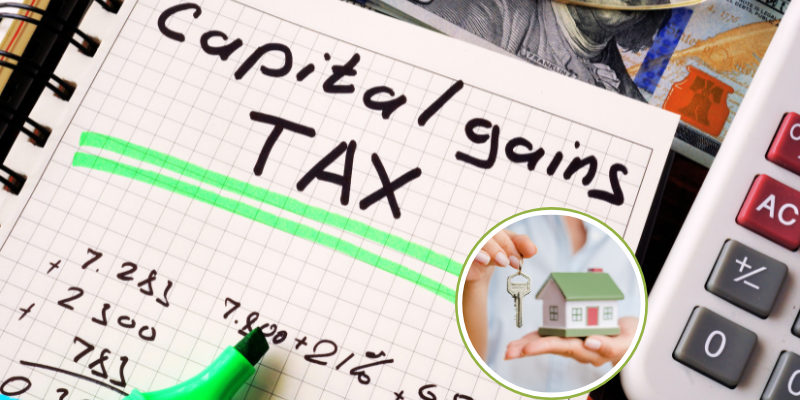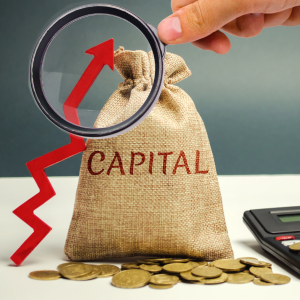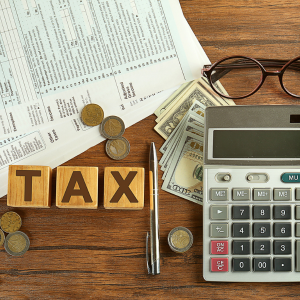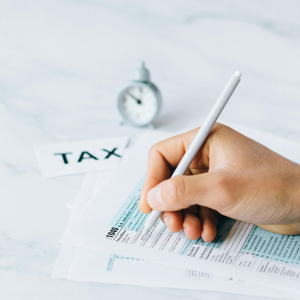
In Alexandria, VA, selling your home is often one of the most important monetary events in your life. It’s great to begin a new journey, but you still have to deal with taxes. When you sell your home, you need to know how the capital gains tax works. You can read this article to learn all about capital gains tax, how Virginia and federal rules affect it, and what you can do to lower the amount you owe. You might be able to keep more of your money and move into your new home more quickly if you plan ahead and get good advice.
Key Highlights
- You have to pay taxes on the money you make when you sell your house in Virginia, just like you do on normal income. This changes the total amount of taxes you owe.
- Virginia doesn’t have set capital gains tax rates like some states or federal programs do.
- You can pay a lot less in taxes if you know your adjusted basis and use the federal homeowner’s exclusion.
- A tax specialist can help you get the most money and make things easier.
- If you sell your house in a year when you make less money, you may be able to lower your state and federal taxes.
What Are Capital Gains?
In a place like Alexandria where there is a lot of demand, capital gains can make a big difference in how much money you make when you sell your house. If you know how these gains are calculated and taxed, you can plan and avoid surprises at tax time. We’ll talk about the basics of capital gains tax and how Virginia handles it differently from the federal government.
Everything You Need to Know About Capital Gains Tax

You have to pay capital gains tax when you sell anything, such a house, for more than you paid for it. The difference between the amount you paid for anything (including any modifications or other costs) and the price you sold it for is your capital gain. This money is usually taxed.
The IRS divides capital gains into two groups:
- Short-term gains are for things you held for less than a year.
- People who have possessed them for more than a year can make long-term gains.
Long-term gains are usually taxed at lower rates than short-term gains, which are taxed at the same rate as your ordinary income. Your cost basis, which is the price you paid for the house plus the cost of any changes you made and selling fees, is a key element of figuring out how much money you made and how much tax you owe. It could be helpful to write down all the modifications you make, such as acquiring a new roof or remodeling your kitchen.
The homeowner’s exclusion is another helpful break that the federal government grants to homeowners. You can leave out up to $250,000 in profit ($500,000 for married couples) from your taxable gain if you’ve owned and resided in your residence for at least two of the last five years. If you meet these conditions, you might not have to pay as much in taxes when you sell.
When you sell your house, you’ll be able to make smart financial decisions if you understand how your cost basis and exclusions function.
Virginia’s Tax on Capital Gains
Virginia taxes capital gains in the same way as it taxes normal income. That means that selling a house doesn’t get you a lower or special tax rate. The money you get from selling it is taxed the same manner as your salary or other income. Virginia’s income tax rates range from 2% to 5.75%, depending on how much money you make in a year.
If you adopt this technique, your state tax payment is based on your total taxable income, which includes any money you gain from selling your residence. If you sell your house when you have less money, you might be able to move into a lower tax bracket and pay less overall.
Since there are no state-specific exclusions or special treatment for capital gains, it’s important to employ federal exemptions and plan your actions carefully to keep your overall obligation under control. It’s also a good idea to stay up to date on any changes to tax legislation at the state and federal levels. Changes to rates or deductions could have an influence on future home sales.
Before you sell your house fast in Virginia, it’s a smart idea to consult a tax expert. They can help you estimate your potential profits, identify eligible deductions, and determine the best time to sell your property for maximum financial benefit.
How to Sell a House in Virginia
Selling a property in Alexandria can be fun, but there are a lot of things to think about, like making your house presentable and figuring out the taxes that come with it. You may make smarter choices and feel less anxious when it’s time to file your taxes if you know how each step of the process affects your money.
Things to Think About Before You Sell Your Home
When you want to sell your home, putting up a “For Sale” sign and setting a price isn’t enough. The real estate market in Alexandria is very competitive, so it’s a good idea to do your research. If you know how long properties in your neighborhood usually stay on the market and how much similar homes are worth, you can choose a reasonable and profitable listing price.
Before you put your property up for sale, take a good look at it. Small modifications or fixes can make a big difference. You can make your home more valued and appealing by painting it, adding better lighting, or making small adjustments to the kitchen and bathroom. Most people who want to buy a house want one that is already set up for living in. These changes can help you sell your house faster and for more money.
It’s also crucial to check that your papers are in order. To have a smooth transaction, the property titles, permits, and disclosure statements must all be clear. In Virginia, sellers have to notify buyers of what condition the property is in. Being honest helps buyers trust you and saves you from getting into issues with the police later.
The right time is also very crucial. Think about how your ambitions for the future, your money, and your taxes all fit together. For example, selling when you make less money can help you pay less in taxes. If you think about these factors, selling your house can be both good for your finances and less stressful.
Things You Should Know About Taxes When You Sell Your House

Taxes might be one of the hardest parts of selling a house, but if you plan, they can be easier. If you sell your house for more than you paid for it, you make a capital gain, and you might have to pay taxes on that gain at both the federal and state levels.
The rate depends on how long you’ve owned the property in the U.S. If you’ve owned a home for more than a year, you usually qualify for lower long-term capital gains rates. You pay the same amount of income tax on it as you do on other things if you own it for less than a year. But if you qualify, the homeowner’s exception can save a lot of your profit from being taxed.
When you file your state taxes in Virginia, your capital gains are added to your normal income. If your total income for the year, including your salary, investments, and profit from selling your residence, puts you in a higher tax bracket, you’ll have to pay more. That’s why some homeowners meticulously plan when to sell their homes, choosing a year when their total income is lower.
Don’t forget about costs that you can write off to minimize your taxable gain. Some moving costs, transfer taxes, and real estate commissions might count. If you keep detailed records of all the costs involved in the transaction, you won’t overlook any savings.
A tax expert can also help you understand how these federal and state rules work together. This will help you stay in compliance and keep as much of your hard-earned money as possible.
Virginia State Taxes and Capital Gains
If you’re planning to sell your home, it’s important to understand how Virginia’s tax system works. In Virginia, capital gains aren’t taxed separately from regular income, meaning the tax impact depends on your overall earnings. By knowing which income bracket you fall into and how your property sale fits within it, you can plan more effectively. We buy houses in Alexandria, making the selling process easier and faster for homeowners who want to move forward without the hassle.
How to Figure Out Your Tax Rate
Virginia’s tax system features a progressive rate structure, which means that the more money you make, the higher the percentage you pay. Your rate, which can be anywhere from 2% to 5.75%, is based on your total taxable income for the year, which includes capital gains.
To find out how much you might owe, add up your salary, bonuses, and the money you got from selling your residence. This will give you your adjusted gross income. This number tells you which bracket you fall into in the state. You might be able to pay less in taxes if you sell something in a year when your income is lower.
The federal government usually charges 0%, 15%, or 20% on capital gains, depending on how much money you make and how long you’ve owned the property. Virginia doesn’t have separate rates, but you can minimize the amount of taxes you owe by planning your payments ahead of time and using federal deductions and exclusions.
What You Should Know About State Taxes on Capital Gains
Virginia taxes capital gains like normal income, so the money you make from selling your house is taxed the same way as any other sort of income. That implies these gains don’t get any special tax reductions or lower rates. The best way to lower your responsibility is to plan ahead and keep good records.
Keep a record of all of your deductible expenses, such as closing costs, real estate commissions, and even some of the costs of moving. These can lower your taxable income, which could keep you in a lower tax bracket. You should also take advantage of the federal homeowner’s exclusion if you can. It can lower your state and federal taxes by not counting some of your gains.
Virginia doesn’t give any specific support with capital gains; therefore, it’s even more important to keep your money in good order. When you sell your property, you can keep more of your money if you do it at the right time, fill out the right paperwork, and get professional assistance.
Getting the Most Cash and the Least Debt
It’s great to make money by selling your Alexandria house, but you should be careful not to have to pay too much in taxes on that money. You can get the most out of your investment and avoid repeating the same mistakes over and over again by developing a plan, keeping track of things, and being aware of them.
Ways to Lower Your Capital Gains Tax Bill
To decrease your capital gains tax, you need to know your adjusted basis. This is the price you paid for the property plus the cost of any repairs, legal fees, and charges associated with selling it. Every improvement you make, like new siding, energy-efficient windows, or a deck, adds to your basis, which lowers the amount of money you have to pay taxes on.
Another good way is to leave out the homeowner. You can keep up to $250,000 in profit ($500,000 for married couples) if you’ve owned and lived in your residence for at least two of the last five years. If you time your sale to meet these requirements, it can have a tremendous effect.
You can also plan how you will sell. If you suspect you’ll make less money this year—maybe because you’re retiring, moving jobs, or working fewer hours—selling then might keep your overall income lower. This would cut your tax rate at both the federal and state levels. You should also think about the costs of selling, including transfer fees or agency fees, which you can deduct.
The most important thing is to plan. You can receive guidance from a tax or financial advisor to put all of these parts together so that you can take advantage of every chance to keep more of your money.
What Home Sellers Shouldn’t Do

Even salesmen who have been doing it for a long time might make mistakes that cost them money. People often forget about taxes before putting their house up for sale. After the sale, a lot of homeowners are astonished by how much they owe.
Another problem is not taking deductions. People sometimes forget that they can write off things like repairs that need to be done, agency fees, and closing costs. If you have your records in order from the start, it will be a lot easier to do your taxes.
Timing can also be an issue. You might have to pay higher taxes if you sell something in a year when you make a lot of money. You might be able to lower what you owe by waiting until a year when you make less money or perhaps moving the date of your closing.
Last but not least, don’t forget about the homeowner’s exclusion rules or miss the deadlines for sending in vital papers. Taking the initiative and talking to a professional will help you avoid these pitfalls and make sure your sale goes as well as it can.
Getting Help from a Professional
It’s hard enough to sell a house without having to deal with convoluted tax rules. That is why many homeowners turn to tax specialists or financial advisors for help. This is especially important if you’re selling an investment property, since there may be additional considerations like capital gains taxes, depreciation recapture, or 1031 exchanges. A professional can help you navigate these complex rules and identify strategies to reduce your tax burden. If you get some guidance from a qualified advisor, it can make a tremendous difference in how successfully you handle your taxes and protect your money.
What Tax Professionals Do
When you have to obey both state and federal requirements, it can be hard to grasp tax laws. A skilled tax professional can help you figure out your adjusted basis, locate deductions you can take, and make sure you meet the requirements for the homeowner’s exclusion.
They can also guide you on the best time to close — whether before or after the new year — based on your income and expenses. In Virginia, where capital gains are taxed as regular income, it’s especially important to understand how your home sale impacts your overall financial situation.
Experienced professionals ensure that all your paperwork and expenses are accurately documented, saving you time and potential headaches with the IRS down the road. Not only can this help you keep more of your money, but it also gives you peace of mind knowing your taxes are handled properly.
4 Brothers Buy Houses buys houses for cash — reach out to us today to discuss your options and make your sale simple and stress-free.
FAQs
What is the capital gains tax when you sell a house in Alexandria, VA?
When you sell your home, you have to pay capital gains tax on the money you make. Virginia taxes these earnings like regular income, using the same rates as the state’s income tax.
How does the federal homeowner’s exception affect the capital gains tax?
You can leave out up to $250,000 ($500,000 for married couples) from your taxable income if you have owned and lived in your home for at least two of the last five years.
What are some ways to decrease the capital gains tax when you sell your home?
Sell your house during a year when your income is lower, keep note of renovations to raise your cost base, and use the homeowner’s exclusion.
Why do I need to hire a tax professional?
A tax expert can help you understand the rules, identify deductions, plan when to sell, and make sure you’re following the law in both the federal and state governments.
What are some common mistakes that merchants make?
Don’t forget to plan your taxes, miss out on deductions, or get the timing wrong. Any of these can raise your taxes more than they need to be.
Helpful Alexandria Blog Articles
- How Much is Home Staging Cost in Alexandria, VA
- Can I Sell My House If I’m Behind on Payments in Alexandria, VA?
- How Long After an Appraisal Can You Close in Alexandria, VA?
- How To Attract Buyers For Distressed Property in Alexandria, VA
- How Much Does A Divorce Home Appraisal Usually Cost in Alexandria, VA
- Common Mistakes When Selling A Fire-Damaged House in Alexandria, VA
- Can Heir Property Be Sold in Alexandria, VA?
- Selling a House with Solar Panels in Alexandria, VA
- Do You Need a Deed to Sell a House in Alexandria, VA?
- How To Sell An Investment Property in Alexandria, VA
- Capital Gains Tax After Selling A House in Alexandria, VA

